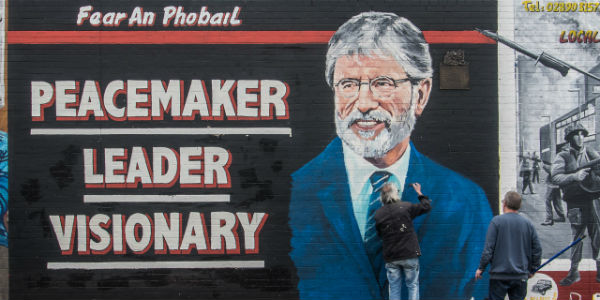What happens when a violent separatist group moderates? The case of Sinn Féin and the IRA
What does it mean for a radical or separatist group to moderate? Does it change its values and goals in the process, or only the ways it communicates them? Looking at Irish republicans, Matthew Whiting explains how Sinn Féin and the IRA came to change their behaviour but not necessarily their goals – while also emphasising the importance of tolerance on the part of the states involved.

Repainting a mural of Gerry Adams in Belfast, 2014. Photo: Udri via a CC-BY-NC-SA 2.0 licence
When Martin McGuinness and Ian Paisley sat side-by-side in a perpetual state of elated laughter, intent on working together to govern a peaceful Northern Ireland, it appeared that Irish republicans [the combined name for Sinn Féin and the IRA] had finally given up their radical ways and become a moderate, mainstream player. All change, or so it seemed.
Yet throughout the long peace process, Irish republicans found themselves having to respond to critics who doubted the depth of their transformation, and those who said they had changed too much. Unionists were adamant that republicans should be treated as some kind of wolf in sheep’s clothing, merely pretending to be moderate until they rose to power. This is precisely why Unionists saw it as necessary to be so rigid in demanding IRA decommissioning and constantly pushed republicans on their violent legacy.
At the same time, republicans were criticised by former comrades-in-arms who declared Gerry Adams and his followers had changed and given up all their principles and ideology in return for a sniff of power in a regional government that still remained under British sovereignty. Meanwhile, Gerry Adams and Martin McGuinness maintained they were the same as ever and had merely adapted to a changing Northern Ireland as a new way to pursue their age-old struggle.
This raises questions about what it means for a radical or violent separatist group to moderate – what must change during this process and what, if anything, can stay the same? Is it enough to only change behaviour? Or must values and goals change too? Must radical groups forsake their past and rein in their demands before we can accept their claims to be newly-minted reformists? These are the questions I set out to investigate.
I found that the radicalism of Irish republicanism was based on three key features: the use of violence; a complete refusal to engage with the existing political system in any meaningful way; and a belief in an alternative claim to sovereignty and rejection of British rule. The first two of these features were mainly about the tactics and behaviour of republicans while the third was more about values. I found that it was necessary for Irish republicans to abandon the use of violence and non-participation, but it was not necessary that they changed their beliefs in order for them to be a moderate actor and to work towards solving the Troubles in Northern Ireland.
Between their emergence in 1969 as outright radicals and their agreeing to the principles of the Belfast (1998) and St Andrews (2006) Agreements, Irish republicans changed their behaviour but not necessarily their values and goals. Sinn Féin agreed to abide by the outcomes of elections, first in the Republic of Ireland and over a decade later in Northern Ireland, and replaced IRA violence with the politics of persuasion as the means to achieve a united Ireland. But they continued to seek a united Ireland as well as insisting that their use of violence up until that point was completely justified.
In fact, when the IRA finally destroyed the last of its weapons in 2005, it still stuck by its radical past and simultaneously declared that ‘our decisions [to destroy our weapons] have been made to advance our republican and democratic objectives… and to end British rule in our country… We reiterate that the armed struggle was entirely legitimate’. Sinn Féin also made it clear that although it now took part in a Northern Irish Assembly that was ultimately answerable to Westminster, it still entirely rejected the right of Britain to rule Northern Ireland.
Republicans instead aimed to use their new political power to transition to a united Ireland in the long-term. In other words, they accepted the peace deal only on condition that the new democratic institutions it established could be used to undo the very existence of Northern Ireland as a political unit under British rule. Indeed, according to the Sinn Féin leadership, the Belfast Agreement ‘is not a political settlement. When set in the context of our strategy, tactics and goals [it] is a basis for further progress and advance of our struggle. It is another staging post’.
So how was such a dramatic transformation of Irish republicanism possible given so many similar attempts to reconcile warring groups in other countries fail? Two factors were important. Firstly, a gradual process of increasing contact with elections and engagement in democratic bargaining led republicans to abandon revolution in return for greater inclusion in a political process. However, as mentioned, they only did so if a route to a united Ireland was possible and if this was accepted as a legitimate aspiration by all sides. This is where the second factor is important, namely the British response. Britain had long accepted the pursuit of a united Ireland as a legitimate goal as long as it was pursued democratically and had the consent of a majority of the people living there.
Britain also made it clear that Sinn Fein would be allowed to emerge as a political force without the British state seeking to repress the party or squeeze its support. (In contrast, Britain introduced some very draconian legislation to combat the IRA, showing how successive British governments viewed the political aspiration and the military means very differently.) This is very unusual when you look at other cases of separatists, where countries like Spain, Turkey and Israel have engaged in banning political parties and refusing to engage with groups that challenge the state for fear of giving them legitimacy or possibly losing territory in the long-term.
So the moderation of Sinn Féin and the IRA could only ever occur at the behavioural level and republicans would not adapt their behaviour if it meant having to give up their goals, values or change their stance on the past. But once republicans made it clear they were willing to consider new routes to their old goals, then it was necessary for Britain (and Ireland) to reciprocate and allow them to emerge in the political arena. In other words, strategic moderation without value change was the product of demand meeting supply. The lesson for other countries is that greater political inclusion may lead to moderation in the right circumstances, but it requires an usually high degree of tolerance by the state which very often may not be readily forthcoming.
This post represents the views of the author and not those of Democratic Audit. It first appeared at LSE British Politics and Policy and draws on the author’s published work in Government and Opposition.
 Matthew Whiting is a Postdoctoral Research Associate at the Centre for Trust, Peace and Social Relations, Coventry University. He completed his PhD at the LSE where he examined the moderation of Sinn Féin and the IRA.
Matthew Whiting is a Postdoctoral Research Associate at the Centre for Trust, Peace and Social Relations, Coventry University. He completed his PhD at the LSE where he examined the moderation of Sinn Féin and the IRA.





 Democratic Audit's core funding is provided by the Joseph Rowntree Charitable Trust. Additional funding is provided by the London School of Economics.
Democratic Audit's core funding is provided by the Joseph Rowntree Charitable Trust. Additional funding is provided by the London School of Economics.
[BLOG] A look at armed movements transitioning into #PoliticalParties using #Ireland as a case via @democraticaudit https://t.co/CsYx6VbtCp
What happens when a violent separatist group moderates? The case of Sinn Féin and the IRA https://t.co/eggscfrzsl
What happens when a violent separatist group moderates? The case of Sinn Féin and the IRA https://t.co/VnS6IYflUs
What happens when a violent separatist group moderates? The case of Sinn Féin and the IRA https://t.co/GrtGQpJ8cl
What happens when a violent separatist group moderates? The case of Sinn Féin and the IRA https://t.co/uIGhCobN5x
What happens when a violent separatist group moderates? The case of Sinn Féin and the IRA https://t.co/NnaxqeU2kX
‘How was such a dramatic transformation of Irish republicanism possible given so many similar attempts have failed?’ https://t.co/GrtGQpJ8cl
What happens when a violent separatist group moderates? The case of Sinn Féin and the IRA https://t.co/GrtGQprwNL https://t.co/HR8dzp6Kid